How to Get 88% Open Rates and 56% CTRs Using Facebook Messenger Bots
- March 4, 2021
- Uncategorized
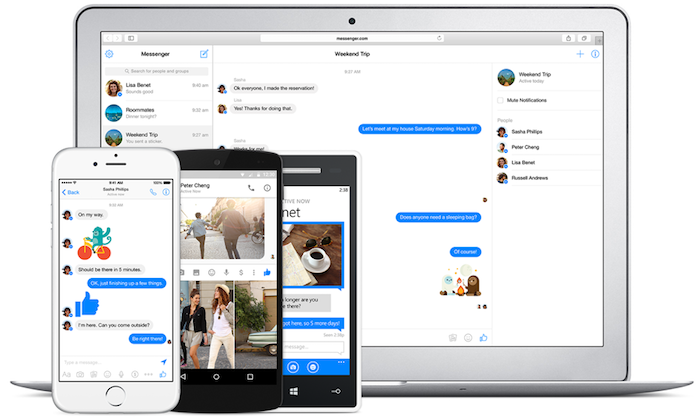
My colleagues recently shared the results of a marketing campaign they conducted using Facebook Messenger bots, which are basically the Facebook version of email marketing.
The metrics shocked me: 88% open rate and 56% click-through rate! Although I’ve had some great email marketing campaigns, it’s hard to top that result.
Why Should You Use Facebook Messenger Bots?
Facebook Messenger bots are a growing part of the marketing scene. It’s an exciting time to dive in and learn all about them.
Being an early adopter of Facebook Messenger bots in your industry will also give you a huge advantage as a marketer.
You may have heard of a concept called first-mover’s advantage or FMA.
The idea is this: if you’re the first one using a specific tactic or employing a particular tactic, you win.
The early adopters of SEO were able to dominate the SERPs and gain massive organic search traffic. The early adopters of Facebook groups built massive followings. The early adopters of Twitter created huge brands and cultivated enormous influence.
The earlier you learn and use a new marketing tactic, the more likely you are to benefit from it.
It’s the perfect time to use Facebook Messenger bots.
When you send a prospect a Facebook message, they’re far more likely to view and click through (CTR) than they would with an email marketing message.
People are responding to Facebook Messenger messages in record-high numbers. I believe you can get up 88% open rates on your Facebook Messenger bot campaigns. What I don’t know is how long the good times are going to last.
Here’s what you need to know about Facebook Messenger bots and how to get started raking in those leads for yourself.
What Facebook Messenger Can Do
First, let’s be completely clear on what Facebook Messenger bots are.
As I mentioned above, using Facebook Messenger bots is a lot like email marketing, but instead of using email, you’re using Facebook messages.
If you’ve ever read my content, heard my talks, or seen my videos, you know that I’m a die-hard email marketer. That hasn’t changed.
What has changed is my view of Facebook Messenger. I now realize that Facebook Messenger has a massive reach, higher levels of interactivity, and more AI capabilities than email.
Here’s what you can do with Facebook Messenger bots:
- You can deliver messaging sequences to people in Messenger.
- You can create a sales funnel that brings in sales right within Messenger.
- You can send downloads (like resources and content upgrades) via Messenger.
- You can have automated conversations with real users on Messenger using AI.
This list is only the beginning; there a ton of other things you can do with it.
The rise of messenger bots does not mean that email is going away; it’s just that messaging is the main way that a lot of people communicate.
What is a Messenger Bot?
Before showing you the details on creating a Messenger bot, I think it would be helpful to talk about bots in general.
When most people hear the word “bot,” they tend to think that it is something bad. It’s true there are bad bots. Some bots are so bad that they’ve given all bots a bad name.
According to Data Dome a software that protects you from falling victim to bad bops:
A bad bot is programmed to perform a task that will hurt your company or your website visitors. It is built with bad intentions and will either directly or indirectly worsen the user experience of the places it crawls.
Bad bots are usually built by cybercriminals, fraudsters, or anyone else who’s involved in illegal activities. Your competitors, too, can use bad bots to hurt you. Bad bots either don’t read or simply ignore the rules in the robots.txt file.
There are good bots, too, like these nice guy types:
- Copyright bots
- Data bots
- Spider bots
- Trader bots
- Service bots
- Sales bots
The entire SEO industry depends on a bot.
Bots is short for “robot,” and as you’re aware, robots can do some pretty awesome things.
The bots we’re talking about aren’t industrial robots or even service bots. They’re sales bots. More specifically, they are Facebook Messenger bots.
Up until recently, such bots have been used mostly in customer service roles. (Below, I’ll show you some platforms for creating a customer service bot).
If you’ve ever chatted on Skype or Messenger with a “customer service rep,” you might have been chatting with a bot.
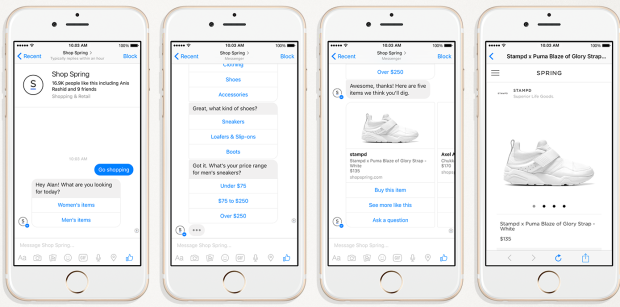
Messenger bots can do way more than just help you book a hotel in Bali or buy a pair of sandals for the summer.
Bots can help us as marketers get higher open rates, clickthrough rates, leads, and sales.
Obviously, Facebook wants as many users as they can on Messenger, so they’re throwing a ton of their own customer service support towards Messenger bot providers and bot builders.
Unlike a cold email list, where you could get spam-listed by disgruntled customers, Facebook Messenger bots are a warm and welcoming opportunity.
How Facebook Messenger Bots Work
There are several ways Facebook Messenger bots can be used.
One way is to embed a link on your website that looks like a typical CTA, but instead of having leads provide their email addresses, the CTA asks if they can message you on Facebook.
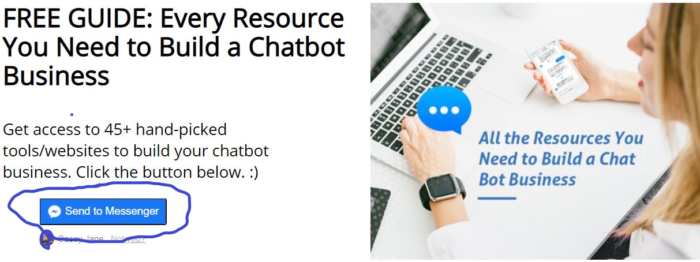
Once someone receives a message, each of their answers will trigger a response or next steps from the bot.
You can set your bots to trigger responses based on keywords that your leads use in their message. For example, if you might have a bot that provides an address if someone messages you about where your business is located.
Another option is to write up your own list of multiple-choice questions. Each selection has a pre-written response from the chat-box. This helps keep leads engaged and feels more like a conversation than email does.
You can also set up your Facebook messenger chat bots to help with customer service.
For example, if you receive a message from someone saying they can’t access their account, your bot can pick up on keywords like “access to account,” and you’ll have a bot ready to help with that particular issue.
The bot might ask for clarity, provide resources or links to FAQs, or tell you that your complaint is being sent to the technical team.
Here’s a recent example from Uber Eats. I messaged them saying an order had not been delivered. This was their first response.
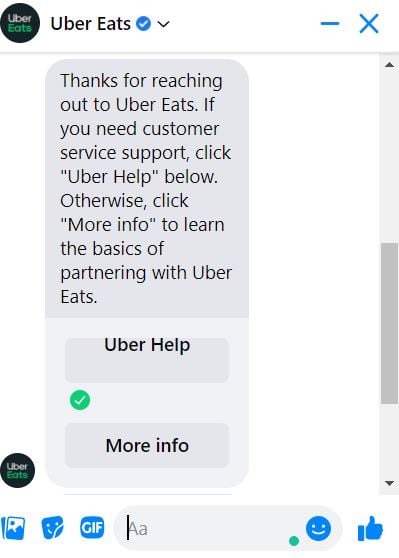
When I clicked on Ubert Help, I received the following response from the bot:
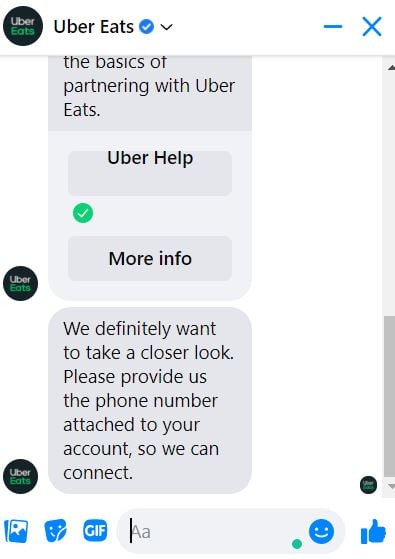
You can also use Facebook chats for:
- Automatically sending chats to people who comment on your posts
- Answer FAQs
- Send “Welcome” messages that introduce your business and point to your website’s landing pages
How to Increase Open Rates Using Facebook Messenger Bots
There are a variety of strategies you can use to increase your Facebook messenger open rates. A few tips:
- Make sure your opening message is engaging. You want to hook your lead right off the bat. You can accomplish this by asking a question, speaking of a product you think they’d like, how you will help them solve a problem they’re having (or a problem in their industry), and using the lead’s first name.
- If you use the strategy of sending your leads multiple-choice questions, make sure your questions are actually engaging. You want your reader to be curious and stay in the conversation until it’s time for them to make a purchasing choice.
- Personify your Facebook messenger bot. Depending on how well known your company is, it may be most effective to have your automatic chats seem like they’re coming from your CEO. You can also create and name cute bots who “introduce” themselves the first time they are used with someone new.
- Ask guiding questions. With each question you ask, steer your leads closer and closer to converting. Max van Collenburg walks you through a great example of this with Logo’s chatbot.
Why Should I Use Facebook Messenger Bots?
I’m showing you all of this information because I’m convinced that messenger bots (which include more than Facebook Messenger) are the next big thing in online marketing.
I’m also totally persuaded that bots can make your business more successful.
It’s hard to argue with facts and data — like the 88% open rates and 56% clickthrough rates.
Here’s some other facts that point towards the success of messenger bots:
- 2.6 billion (yes, billion!) people use Facebook Messenger every month. Your ideal customer is probably using Messenger.
- Many prospective customers aren’t comfortable providing their email address in exchange for your free download anymore. Worse, they might completely ignore your marketing emails because they have email fatigue.
- From the customer’s perspective, opting into an email newsletter or campaign requires more steps and work than opening up a Facebook Messenger thread.
- From your perspective as a marketer, building an email list takes a lot of work. Creating a list of Facebook Messenger leads is a lot less work because of the reduced friction. Messenger is a one-click subscription instead of having to type in your email, click submit, confirm email, etc.
- A Messenger bot can have a sequence just like an email campaign. Sequences can be as long or short as you want and have as many options (or more) than an email sequence.
- Messenger sequences are way faster than email campaign sequences. With an email campaign sequence, you typically should wait a day or two before sending additional emails. With Facebook Messenger, you can send more messages in the next 10 seconds, 10 minutes, 10 days, whatever you want. Best of all, the response is instant and you can engage in real, live conversations with your leads.
- Prospects can instantly engage in live chat, which helps to close sales faster and with less friction.
- Retargeting your Messenger leads is easier and faster than retargeting email leads since the leads are already on Facebook.
- Messenger bots have the same kind of opt-in appeal that email lead generation forms have — popups, slide-ins, buttons, boxes, etc. You can even gain a new lead when they leave a comment on your Facebook page.
- Messenger is completely optimized for mobile or desktop, meaning no more mobile configuration for email messages.
Getting leads using Facebook Messenger is easy, but actually creating chat bots may prove a little more difficult. However, with the help of software engineers or a tool for beginners, you can too create a chat bot.
Let me tell you about my own experience.
How to Create Your Own Interactive Facebook Messenger Bot
My guess is at this point in the article, most readers are going to bail.
I understand.
Creating anything, especially something as complicated-sounding as a bot, is going to drive some readers away.
However, you should know that creating a Facebook Messenger bot does not have to be too complicated.
There are two main ways to create chat bots:
- The programmer’s way
- The easy way
If you have programming experience and know your way around Python, Flask, and Heroku, then you can consider making your own Facebook Messenger bot.
If you’re like me and don’t know how to code, then you can choose the easy way.
I’ll share the resources for both methods.
First, we’ll go over the programmer’s method. Then, we’ll talk about the easy way. If you’re not a programmer, you can skip this first section.
The Programmer’s Method of Creating a Facebook Messenger Bot
Instead of providing a step-by-step tutorial, I’ll give you the best resources I found on the subject:
1. Facebook Messenger Bot Tutorial: Step-by-Step Instructions for Building a Basic Facebook Chat Bot
Hartley Brody has a lot of helpful resources for Messenger bots. This article provides a really helpful starting point.
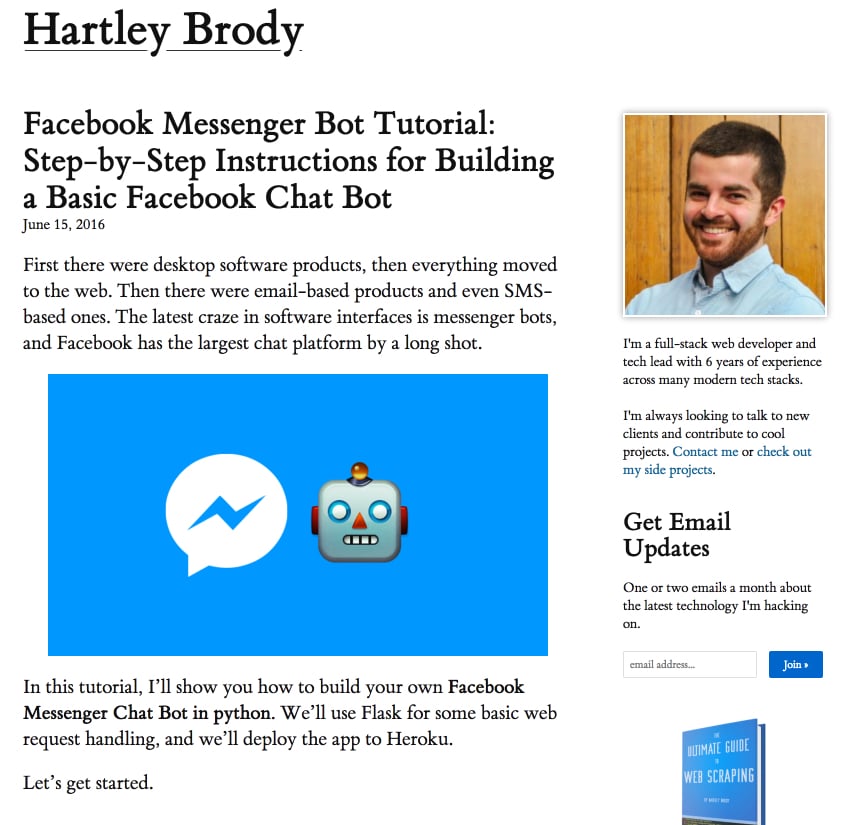
2. GitHib – Creating Your Own Facebook Messenger Bot
This Github guide is designed for beginners and intermediates.
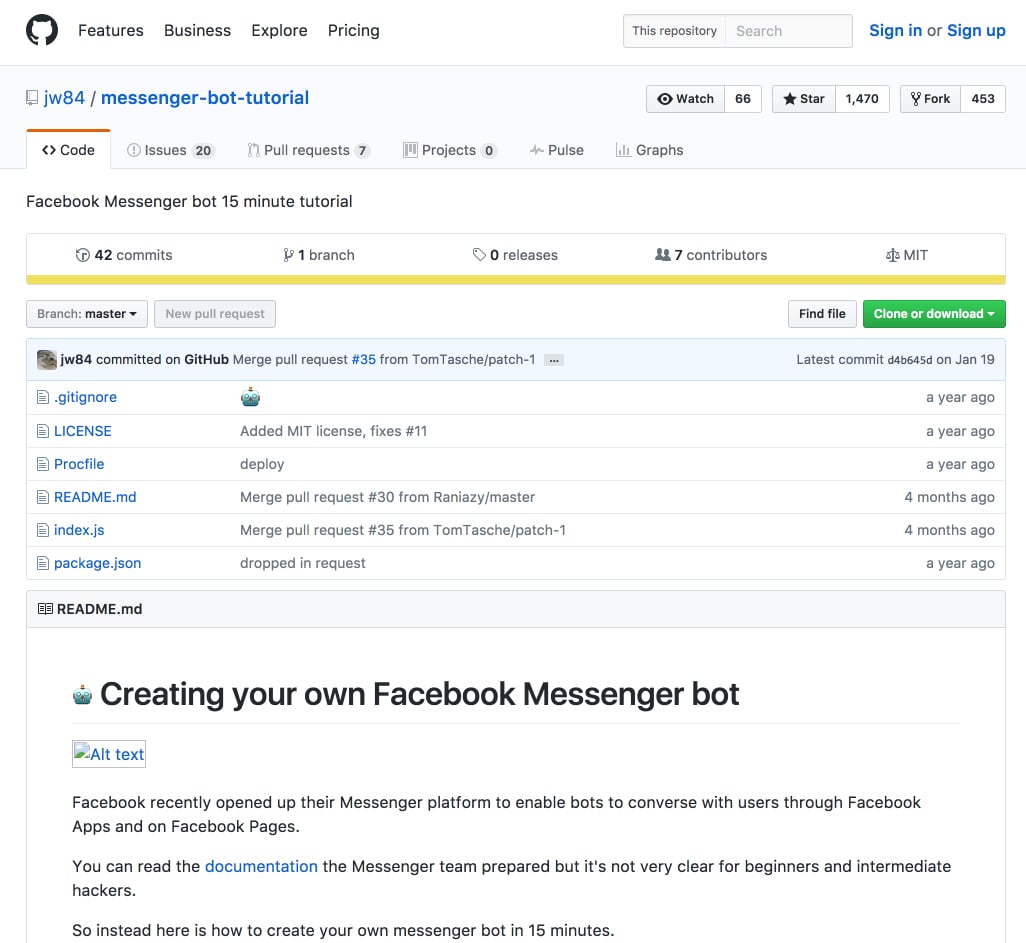
3. (YouTube Series): Make Your Own Facebook Bot
For a nice visual lesson, check out this YouTube tutorial. The video walks through the stages of creating a bot on the Facebook Messenger Platform API.
4. Facebook Developers – Messenger Platform
Facebook is eager to help developers and programmers create Messenger bots.
Their tutorial is best for advanced programmers and shows the basics of creating a functioning bot in 15 minutes.
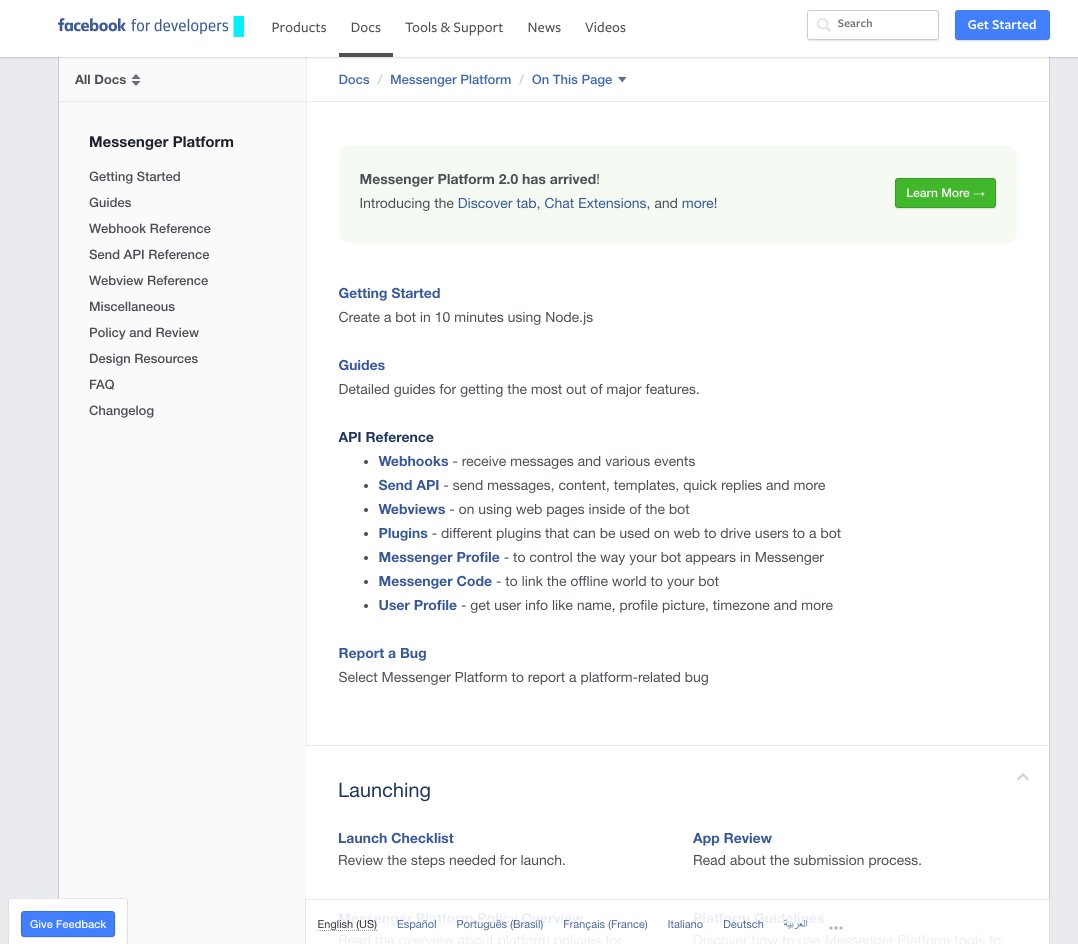
Coding is fine, especially if that’s your jam.
However, keep in mind that doing so requires extensive coding knowledge, not to mention hours of work.
The Easy Way to Create a Facebook Messenger Bot
Marketers who aren’t coders (isn’t that most of us?) are adept at using online tools and programs. Creating a chat-bot is as easy as any marketing SaaS or tool you’ve used.
To create my first Facebook bot, I used MobileMonkey. I found it to be easier than using Mailchimp.
There are other options out there, which I’ll share at the end of this article.
To start, go to MobileMonkey.com.
First, I clicked the green “Get MobileMoney Free” button.
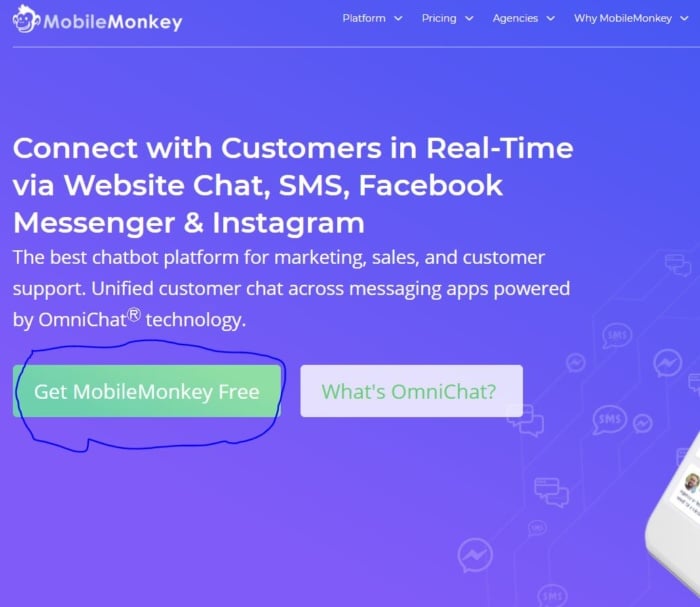
Then I clicked the blue “Get MobileMonkey Free” button. This page has two CTAs, so you could also click on the “Claim Your Free Account” button.
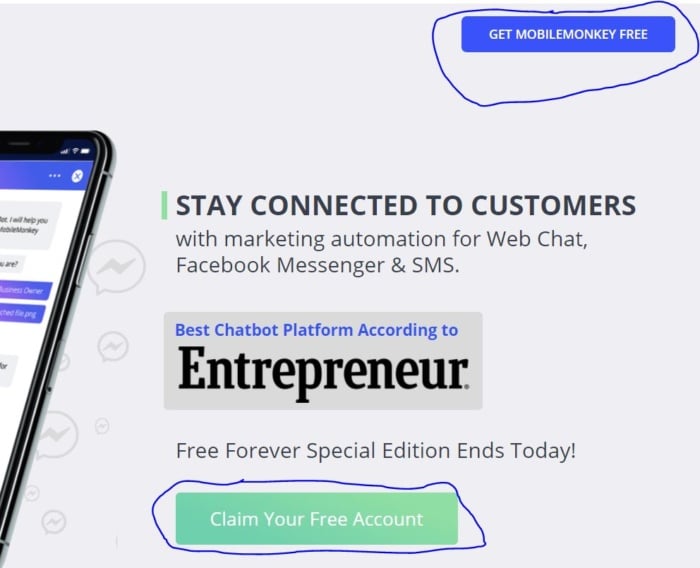
Obviously, I had to approve what MobileMonkey could do on my Facebook page.
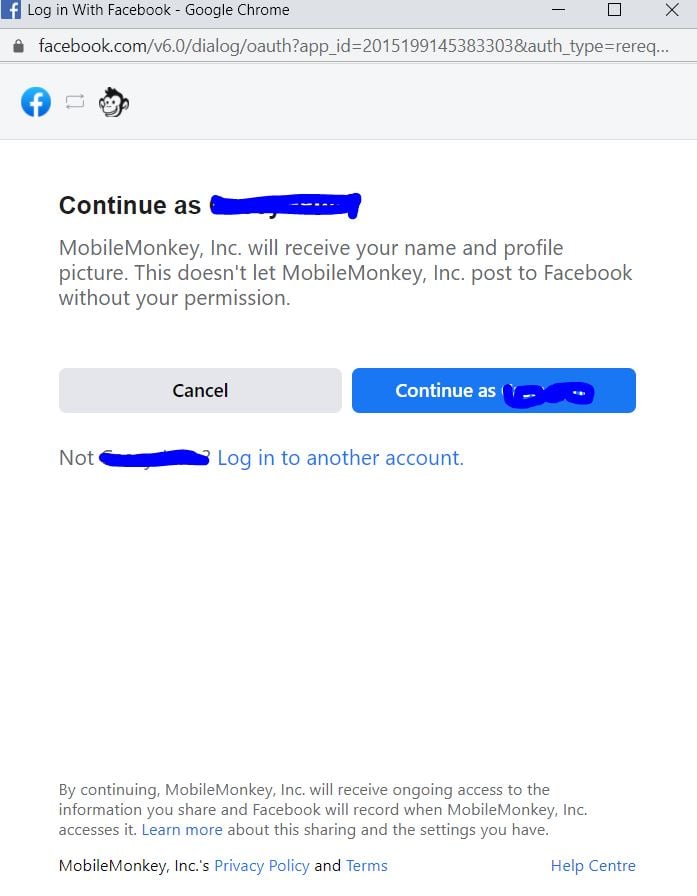
First, I went through a quick and easy onboarding process to connect my page to a bot.

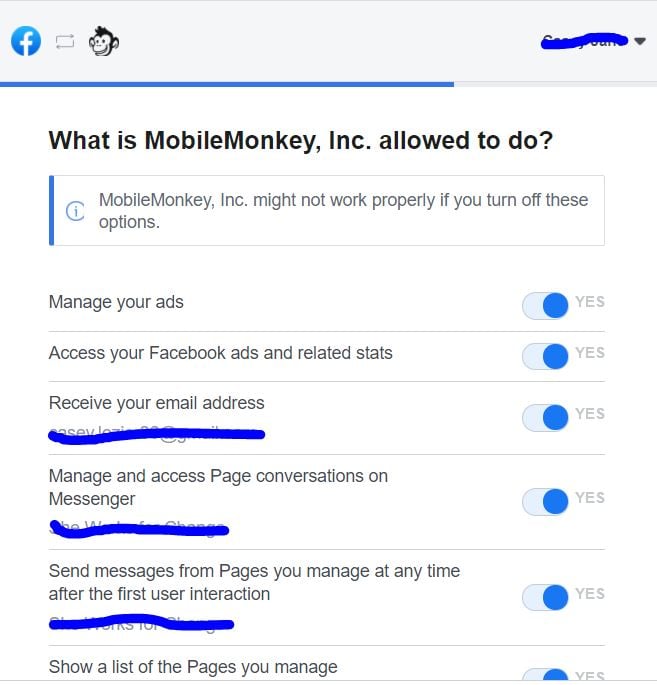
After that, you will be taken back to MobileMonkey to fill in some additional details:
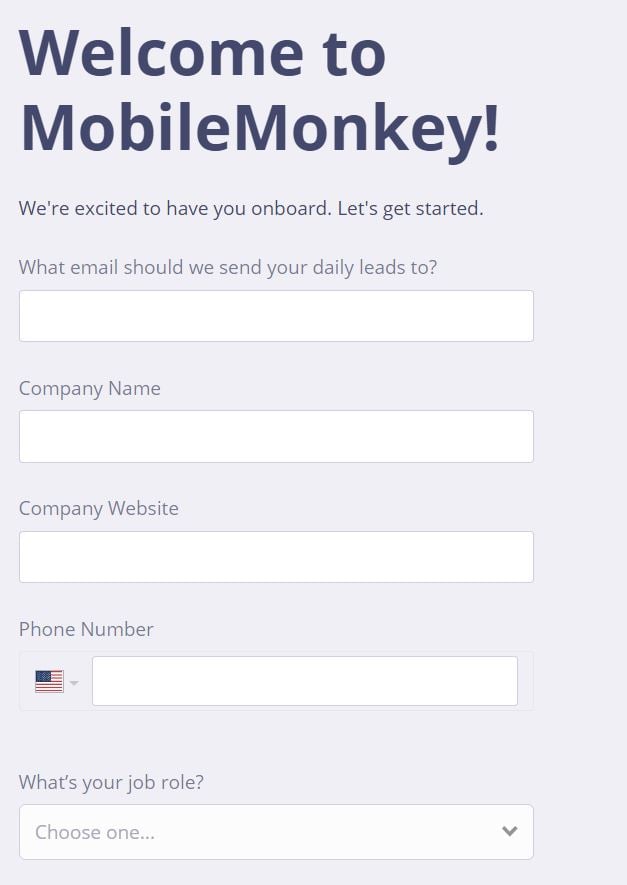
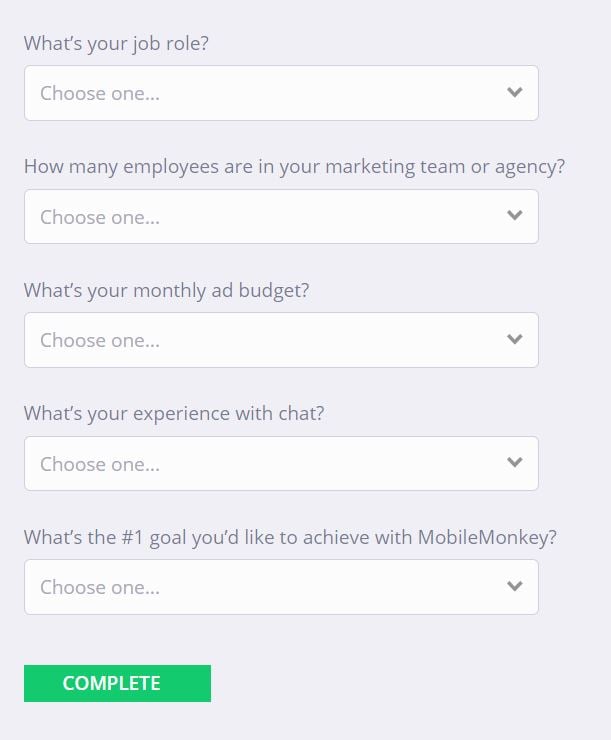
After you have everything set up, you can monitor your audience, create a website chat widget, use growth tools, and use the other useful tools.
Other Platforms for Creating Facebook Messenger Bots
Obviously, MobileMonkey isn’t the only business that offers easy-to-create Facebook Messenger bots.
Here are a few other options for your consideration.
1. Chatfuel
Chatfuel is one of the leading innovators in the chatbot industry, and you’ll find all the resources you need on their blog.
One of Chatfuel’s best features is a huge range of templates for different chat functions.
2. ManyChat
ManyChat, a popular platform for building Facebook chatbots, has both free and paid plans.
3. Botsify
Botsify is another AI-centric bot platform that is ideal for customer service functions. Botsify is used by some of the larger brands, like Apple and Shazam.
If you’re a programmer, you’ll be thrilled with the integrations via plugins. If you’re not a programmer, you’ll love the drag ‘n drop template designer.
4. Bot List
Bot List is the best resource to find and experiment with bots. They are the “App Store” for conversational software.
5. Bot Academy
Bot Academy is an educational resource for Facebook Messenger bots, with plenty of helpful articles, data, and studies.
Conclusion
Facebook Messenger bots are a mashup of social, mobile, and instant messaging power, which is exactly the direction that marketing is going.
The last thing that you want is to become antiquated — confused to why your old-school marketing techniques aren’t working as well as they used to.
As digital marketers, it’s important for us to be adaptive and flexible.
Facebook Messenger bots are the future, and it’s time to start using them. If you don’t want to do it on your own, consider hiring my agency.
Let me know about your experience using Facebook Messenger bots or any questions you might have about them.
The post How to Get 88% Open Rates and 56% CTRs Using Facebook Messenger Bots appeared first on Neil Patel.
About us and this blog
We are a digital marketing company with a focus on helping our customers achieve great results across several key areas.
Request a free quote
We offer professional SEO services that help websites increase their organic search score drastically in order to compete for the highest rankings even when it comes to highly competitive keywords.
Subscribe to our newsletter!
More from our blog
See all postsRecent Posts
- Web Hosting September 26, 2023
- Affiliate Management September 26, 2023
- Online Presence Analysis September 26, 2023

